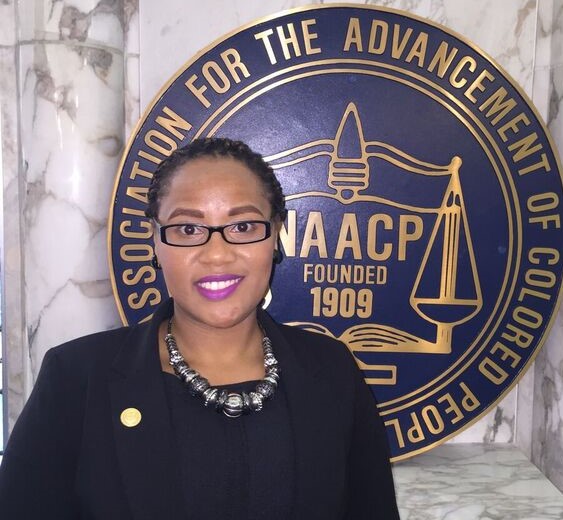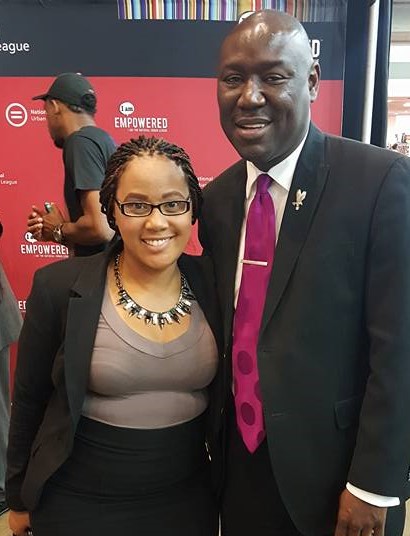Dayton Docket

"A Lifetime Experience"
Last summer Shanir Jina Carter became part of a proud history when she worked as an NAACP Law Fellow in Baltimore, Maryland.
Now the program promises to play a significant role in her personal history. “It provided me with a wealth of exposure to the legal field in a nurturing and enriching environment," she says.
Carter is encouraging fellow law students to apply for this summer’s Law Fellow Program at the NAACP’s national headquarters. “I met so many people I would not meet just sitting down in an office,” says Carter, a third-year law student and president of the Black Law Student Association.
The National Association for the Advancement of Colored People is the nation’s largest and oldest civil rights organization – founded in 1909 – but Carter acquired some very present-day legal skills. She reviewed and edited contracts, replied to correspondence from citizens who may have a civil rights claim, worked on research and writing assignments related to education and environmental justice, and drafted an affirmation litigation project.
“Shanir was a joy to work with,” says Khyla Craine, the NAACP’s assistant general counsel.
During the 10-week internship, Craine witnessed tremendous growth in Carter’s confidence level and legal writing ability. “She became more outgoing and secured the confidence to speak more loudly and boldly,” Craine says.
The fellowship re-ignited Carter’s passion for civil rights law – a passion born five years ago when 17-year-old Trayvon Martin was shot and killed in Sanford, Florida, not far from her home at the time.
She took part in protests, only to be asked pointedly by some of her co-workers, “Were you at the riots?”
“Co-workers referring to the protests as riots was in many ways code language, telling me that we should not be standing up for our rights,” Carter recalls.
Trayvon Martin’s death brought back memories of witnessing civil rights violations as a child growing up in Baltimore City. Carter had long wanted to go into public service, and ongoing national controversies strengthened her commitment to pursuing civil rights law.
At Dayton Law, Carter continually is learning concrete ways to fight for civil rights. “In my civil rights enforcement class, professor Andrea Seielstad talked about real life things and where you can fit in as a lawyer doing civil rights work,” she says.
Seielstad encouraged Carter to apply for the NAACP fellowship. The program included numerous field trips -- from the United States Supreme Court to private law firms to Fortune 500 companies. “This experience really opened my eyes and showed me that you can use a civil rights perspective when working at a governmental agency or at a firm or a corporation,” she says. “There are so many ways you can be an advocate for civil rights and constitutional issues.”
She will never forget visiting the Supreme Court. “They put your cell phone in a locker and usher you in like a church service,” Carter says. “We heard opinions being read from the highest court, and it was amazing. I was close enough to see the sweat running down Justice Clarence Thomas’ face.”
Afterward the students met with Tonia Jones Powell, staff counsel for the United States Supreme Court. “She’s a black woman, and it was very moving, memorable and inspiring to speak with her about her career path,” Carter says.
 Another highlight was meeting Benjamin Crump, the attorney for Trayvon Martin’s family. “He encouraged me to get everything I could out of law school,” she says. “Meeting him brought everything full circle and solidified the whole experience.”
Another highlight was meeting Benjamin Crump, the attorney for Trayvon Martin’s family. “He encouraged me to get everything I could out of law school,” she says. “Meeting him brought everything full circle and solidified the whole experience.”
The fellowship is designed to be a well-rounded program, and Carter’s wide variety of tasks included planning for the national NAACP convention in Cincinnati last summer. “Shanir did a fantastic job of interacting with our members from all over the country,” Craine says.
Carter came away with something far more valuable than summer employment.
“This is not just a job,” she says. “It’s a lifetime experience.”
Applications are now being accepted for the 2017 program from students who have completed at least one year of law school. The Law Fellows will work for the summer at the NAACP Headquarters in Baltimore, Maryland. For more information, visit the NAACP website.
